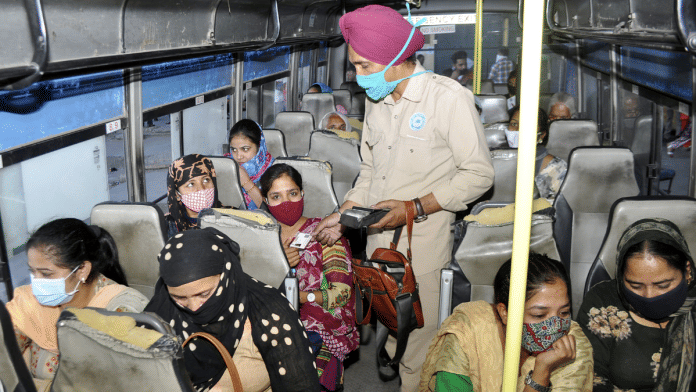Bhopal: Nearly two decades after the Madhya Pradesh State Transport Corporation was dismantled in 2005, CM Mohan Yadav has given an in-principle approval to a panel for a feasibility study on a ‘Gramin Parivahan Seva’ providing last mile connectivity to rural parts from district headquarters.
The need for a rural transportation service came up for discussion Friday during a review meeting of the transport department.
The Babulal Gaur-led BJP government’s decision to shut down the corporation citing huge losses had created a huge vacuum in the road transportation network. Though private players swiftly moved in, they operated on usual routes, leaving most of the villages and rural areas deprived of any public transportation service.
“The CM understands the need for providing rural transportation, not just for giving a boost to economic activity, providing basic connectivity to medical facilities and education institutes, but also as a matter of equity, with the less privileged having as much right over the roads of the states as those having cars,” a senior official of the transport department said.
“Giving an in-principle approval, the CM has asked the departments concerned to come up with a suitable model that can be institutionalised and if found suitable by the committee, it will be put before the cabinet for implementation.”
Apart from the transport department, Finance, Public Works Department (PWD) and Rural Development would be involved in the study.
In Madhya Pradesh, Bhopal and Indore are the only two cities to have a bus service in the urban areas, but beyond the city limit, the 8.77 odd crore population of the state is dependent on private operators that ply on selected routes.
Madhya Pradesh, Chhattisgarh and Jharkhand are the only three states in India, where there is no state owned or sponsored public road transportation network.
Another senior official explained that there are three models that are being deliberated upon — the first is the state government owning and operating a transport corporation; the second is owning the buses and infrastructure while outsourcing the operations.
The final and the most likely option is to rope in private operators and extend their services on non-profitable routes through a Viability Gap Funding (VGF) model to cover entire districts.
This model of services was experimented on pilot bases in Vidisha, the constituency of former CM Shivraj Singh Chouhan, for six months from May 2022.
“We had taken a leaf out of the carbon credit scheme of the power ministers and through complex calculations, derived upon a formula wherein every operator could earn credit per km travelled per passenger. These credits would then be compensated as funds,” former transport commissioner Mukesh Jain, under whom the project was rolled out in Vidisha, told ThePrint.
In 2022, the Atal Bihari School of Good Governance was roped in to develop the Rural Transport Credit (RTC) system.
As per the credit system, if a seven-seater vehicle covers 100 km in one day, it is assumed that 700 passengers per km took service while 21,000 passengers per km availed the service in the entire month.
For the 21,000 passengers per km ferried, the vehicle owner is allotted 21,000 credit points, with each point translating into a subsidy of Rs 15 paise. This can add up to a subsidy of Rs 3,150 per month given to the transport department
Similarly, a 12-seater vehicle is allocated a subsidy of Rs 5,400 per month as per the credit system for 100 km covered per day.
As a part of the project, 76 routes from tehsils to 546 villages were identified covering 1,513 km and benefitting roughly 4.70 lakh villagers. Additionally, 36 new permits were issued and all the vehicles under this system were exempted from motor vehicle tax.
The pilot project was successful and there were plans to spread it across five more districts, but it was abruptly shut down after delays in payment made to the transport department following bureaucratic hurdles, another official said.
“One of the biggest apprehensions is the losses incurred, and the need for a suitable model that can at best minimise losses, if not operate it profitably,” the official said.
(Edited by Tony Rai)
Also Read: MP ministers will now pay their own income tax, 1972 rule putting onus on state govt struck down






